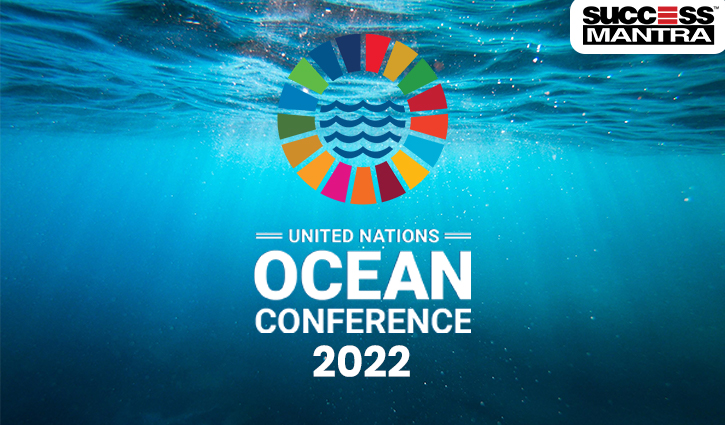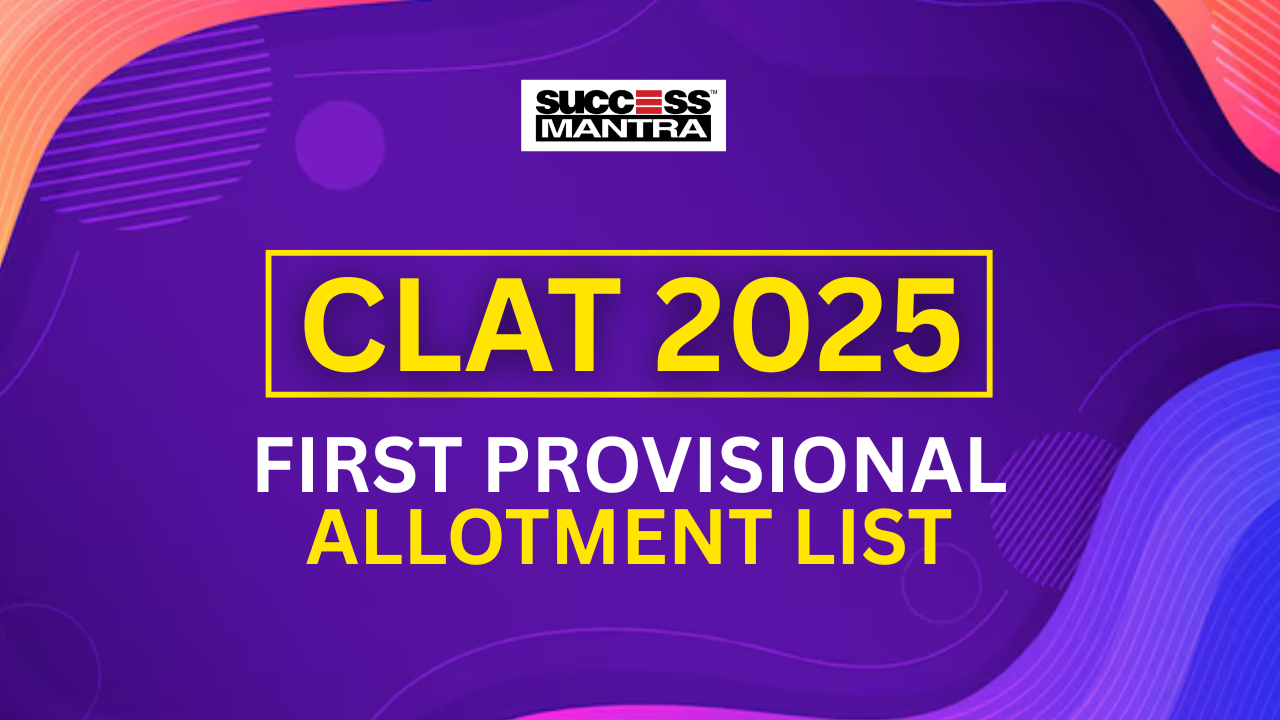
UNITED NATIONS OCEAN CONFERENCE 2022
UNITED NATIONS OCEAN CONFERENCE 2022
Recently, the UN (United Nations) Ocean Conference 2022 was held to ensure global cooperation towards protection and sustenance of the Ocean ecosystem of the world. The conference was co-hosted by the Governments of Kenya and Portugal. The Minister of Earth Sciences led the Indian delegation at the UN Ocean Conference. India promised to provide science and innovation-based solutions for the implementation of Goal 14 through partnerships and environmentally friendly. The UN Ocean conference 2022 is aligned to SDG (Sustainable Development Goals) 14 'life below water' and stresses on the critical need for scientific knowledge and marine technology to build ocean resilience.

Current Affairs Notes By Success Mantra Coaching Institute GTB Nagar Delhi CLICK HERE
WHAT IS THE KEY AGENDA OF THE CONFERENCE?
- Moratorium on Deep Sea Mining: Push for a moratorium on deep-sea mining of rare metals needed for a boom electric vehicle battery construction. The digging and gauging of the ocean floor by machines can alter or destroy deep-sea habitats.
- Carbon Sequestration: Focus on carbon sequestration to boost the ocean's capacity to soak up CO2, by either enhancing natural sinks such as mangroves or through geoengineering schemes.
- Blue Deal: A “Blue Deal” was promoted to enable the sustainable use of ocean resources for economic growth. It includes global trade, investment and innovation to create a sustainable and resilient ocean economy. Focus on blue food to ensure marine harvests from all sources are sustainable and socially responsible.
- High Seas are Unregulated: No comprehensive legal framework covers the high seas. Oceans cover some 70% of the earth’s surface and provide food and livelihoods for billions of people. Some activists refer to them as the largest unregulated area on the planet.
- Threat to Ocean: Threats to the oceans include global warming, pollution (including plastic pollution), acidification, marine Heatwaves etc.
- What are the Initiatives to Ensure a Sustainable Ocean Ecosystem?
- Decade of Ocean Science for Sustainable Development: The UN has proclaimed a Decade of Ocean Science for Sustainable Development (2021-2030) to support efforts to reverse the cycle of decline in ocean health and gather ocean stakeholders worldwide behind a common framework.

WORLD OCEANS DAY
- 8th June is World Oceans Day, the United Nations day for celebrating the role of the oceans in our everyday life and inspiring action to protect the ocean and sustainably use marine resources.
- Marine Protected Areas: In general terms, a Marine Protected Area (MPA) is a marine area that provides protection for all or part of the natural resources it contains.
- Glitter Partnerships Project: It is launched by the International Maritime Organization (IMO) and the Food and Agriculture Organization of the UNs (FAO) and initial funding from the Government of Norway. It is aimed to prevent and reduce marine plastic litter from shipping and fisheries.
- India- Norway Ocean Dialogue: In 2019, the Indian and Norwegian governments agreed to work more closely on oceans by signing a MoU and establishing the India-Norway Ocean Dialogue.
INDIA'S DEEP OCEAN MISSION:
It is a mission mode project to support the Blue Economy Initiatives of the Government of India. India’s Indo-Pacific Oceans Initiative (IPOI): It is an open, non-treaty based initiative for countries to work together for cooperative and collaborative solutions to common challenges in the region.

PRAVAHINI Current Affairs Notes By Success Mantra Coaching Institute GTB Nagar Delhi CLICK HERE
INTERNATIONAL MARITIME ORGANIZATION
The International Maritime Organization (IMO) is a specialized agency of the United Nations (UN). It is a global standard-setting authority with responsibility to improve the safety and security of international shipping and prevention of marine and atmospheric pollution by ships. The IMO is not responsible for enforcing its policies. There is no enforcement mechanism to implement the policies of the IMO. Its main role is to create a regulatory framework for the shipping industry that is fair and effective, universally adopted and universally implemented. It is also involved in legal matters, including liability and compensation issues and the facilitation of international maritime traffic. It was established by means of a Convention adopted under the auspices of the United Nations in Geneva on 17 March 1948 and met for the first time in January 1959. It currently has 174 Member States and 3 associate members.
CONCLUSION
The post Covid-19 economy should prioritise sustainability and resilience in ocean-based value chains. The Covid-19 pandemic unevenly impacted ocean sectors such as marine fisheries, marine and coastal tourism and maritime transport. Expanding digitisation efforts to lower costs for business in developing countries, setting up a blue bank for investments, and improving regulations of blue finance. All of these suggestions can be seen as a call for a Blue New Deal, as sister to the Green New Deal already gaining political support and traction around the world.
TEST YOURSELF
Q.1 UN (United Nations) Ocean Conference 2022 which was held to ensure global cooperation towards protection and sustenance of the Ocean ecosystem was co-hosted by the Governments of ________ & _______?
- Uganda & Portugal
- Nigeria & Argentina
- Portugal & Kenya: ANSWER
- None of the above-mentioned
Q.2 Consider the given options & state on which of the following dates World Ocean Day is celebrated?
- 8th of June: ANSWER
- 10th of June
- 6th of July
- None of the above-mentioned
Q.3 The idea of World Oceans Day was first proposed at the United Nations Conference on Environment and Development (UNCED) in 1992 in _________?
- Geneva, Switzerland
- Budapest, Hungary
- Santiago, Chile
- Rio de Janeiro, Brazil: ANSWER
Q.4 The Cabinet Committee on Economic Affairs has approved which of the following Ministries' proposals on the Deep Ocean Mission (DOM)?
- Ministry of Water Resources & River Development
- Ministry of Earth Sciences: ANSWER
- Ministry of Jal Shakti
- None of the following
Q.5 Which of the following given statements is/are correct in the reference to the Deep Ocean Mission of the Central Government?
- The cost of the Mission has been estimated at Rs. 4,077 crore over a five-year period and will be implemented in phases
- It will be a mission mode project to support the Blue Economy Initiatives of the Government of India.
- The technology and expertise needed in such missions is now available with only four countries - US, Germany, France & United Kingdom. India will now be the fifth country to have it.
- II & III follows
- Only I follows
- I, II & III follows
- None of the above: ANSWER
Click Here to Read More Article on Success Mantra Blog













0 Comment